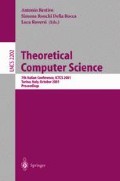Abstract
In this paper, we introduce a cut-free sequent calculus for minimal conditional logic CK and three extensions of it: namely, with ID, MP and both of them. The calculus uses labels and transition formulas and can be used to prove decidability and space complexity bounds for the respective logics. As a first result, we show that CK can be decided in O(n log n) space.
Access this chapter
Tax calculation will be finalised at checkout
Purchases are for personal use only
Preview
Unable to display preview. Download preview PDF.
References
C. Boutilier, Conditional logics of normality: a modal approach. Artificial Intelligence, 68:87–154, 1994.
B. F. Chellas, Basic Conditional logics, J. of Philosophical Logic, 4:133–153,1975.
G. Crocco and L. Fariñas del Cerro, Structure, Consequence relation and Logic, volume 4, pages 239–259. Oxford University Press, 1992.
G. Crocco, L. Fariñas del Cerro, and A. Herzig, Conditionals: From philosophy to computer science, Oxford University Press, Studies in Logic and Computation, 1995.
G. Crocco and P. Lamarre, On the Connection between Non-Monotonic Inference Systems and Conditional Logics, In B. Nebel and E. Sandewall, editors, Principles of Knowledge Representation and Reasoning: Proceedings of the 3rd International Conference, pages 565–571, 1992.
J. P. Delgrande, A first-order conditional logic for prototypical properties. Artificial Intelligence, (33):105–130, 1987.
H. C. M. de Swart, A Gentzen-or Beth-type system, a practical decision procedure and a constructive completeness proof for the counterfactual logics VC and VCS, Journal of Symbolic Logic, 48:1–20, 1983.
M. Fitting, Proof methods for Modal and Intuitionistic Logic, vol 169 of Synthese library, D. Reidel, Dordrecht, 1983.
N. Friedman and J. Halpern, On the complexity of conditional logics. In Principles of Knowledge Representation and Reasoning: Proceedings of the 4th International Conference, KR’94, pages 202–213.
N. Friedman and J. Halpern. Belief Revision: A critique, J. of Logic, Language and Information, 8(4): 401–420, 1999.
D. M. Gabbay, Labelled Deductive Systems (vol I), Oxford Logic Guides, Oxford University Press, 1996.
D. M. Gabbay L. Giordano, A. Martelli, N. Olivetti and M. L. Sapino, Conditional Reasoning in Logic Programming. J. of Logic Programming 44(1-3):37–74, 2000.
I. P. Gent, A sequent or tableaux-style system for Lewis’s counterfactual logic VC. Notre Dame j. of Formal Logic, 33(3): 369–382, 1992.
M. L. Ginsberg. Counterfactuals. Artificial Intelligence, 30(2):35–79, 1986.
L. Giordano, V. Gliozzi and N. Olivetti, A conditional logic for belief revision. In Proc. European Workshop on Logics in Artificial Intelligence JELIA 98, Springer LNAI 1489, pp. 294–308, 1998.
L. Giordano, V. Gliozzi, and N. Olivetti. Iterated Belief Revision and Conditional Logic. Studia Logica, to appear, 2001.
A. Artosi, G. Governatori, and A. Rotolo: A Labelled Tableau Calculus for Nonmonotonic (Cumulative) Consequence Relations. In Proc.of TABLEAUX 2000, LNCS 1847, pp. 82–97, 2000
G. Grahne, Updates and Counterfactuals, in Journal of Logic and Computation, Vol 8 No.1:87–117, 1998.
C. Groeneboer and James Delgrande, A general approach for determining the validity of commonsense assertions using conditional logics. International Journal of Intelligent Systems, (5):505–520, 1990.
J. Hudelmaier, An O(n log n)-space decision procedure for intuitionistic propositional logic. Journal of Logic and Computation, 3, 63–75, 1993.
Sarit Kraus, Daniel Lehmann, and Menachem Magidor. Nonmonotonic reasoning, preferential models and cumulative logics. Artificial Intelligence, 44:167–202, 1990.
P. Lamarre. A tableaux prover for conditional logics. In Principles of Knowledge Representation and Reasoning: Proceedings of the 4th International Conference, KR’94, pages 572–580.
D. Lewis, Counterfactuals. Basil Blackwell Ltd, 1973.
D. Nute, Topics in Conditional Logic, Reidel, Dordrecht, 1980.
N. Olivetti and C. Schwind, Analytic Tableaux for Conditional Logics, Technical Report, University of Torino, 2000.
C. B. Schwind, Causality in Action Theories. Electronic Articles in Computer and Information Science, Vol. 3 (1999), section A, pp. 27–50.
R. Stalnaker, A Theory of Conditionals, in N. Rescher (ed.), Studies in Logical Theory, American Philosophical Quarterly, Monograph Series no.2, Blackwell, Oxford: 98–112, 1968.
L. Viganò, Labelled Non-classical Logics. Kluwer Academic Publishers, Dordrecht, 2000.
Author information
Authors and Affiliations
Rights and permissions
Copyright information
© 2001 Springer-Verlag Berlin Heidelberg
About this paper
Cite this paper
Olivetti, N., Schwind, C.B. (2001). A Calculus and Complexity Bound for Minimal Conditional Logic. In: Theoretical Computer Science. ICTCS 2001. Lecture Notes in Computer Science, vol 2202. Springer, Berlin, Heidelberg. https://doi.org/10.1007/3-540-45446-2_25
Download citation
DOI: https://doi.org/10.1007/3-540-45446-2_25
Published:
Publisher Name: Springer, Berlin, Heidelberg
Print ISBN: 978-3-540-42672-1
Online ISBN: 978-3-540-45446-5
eBook Packages: Springer Book Archive

